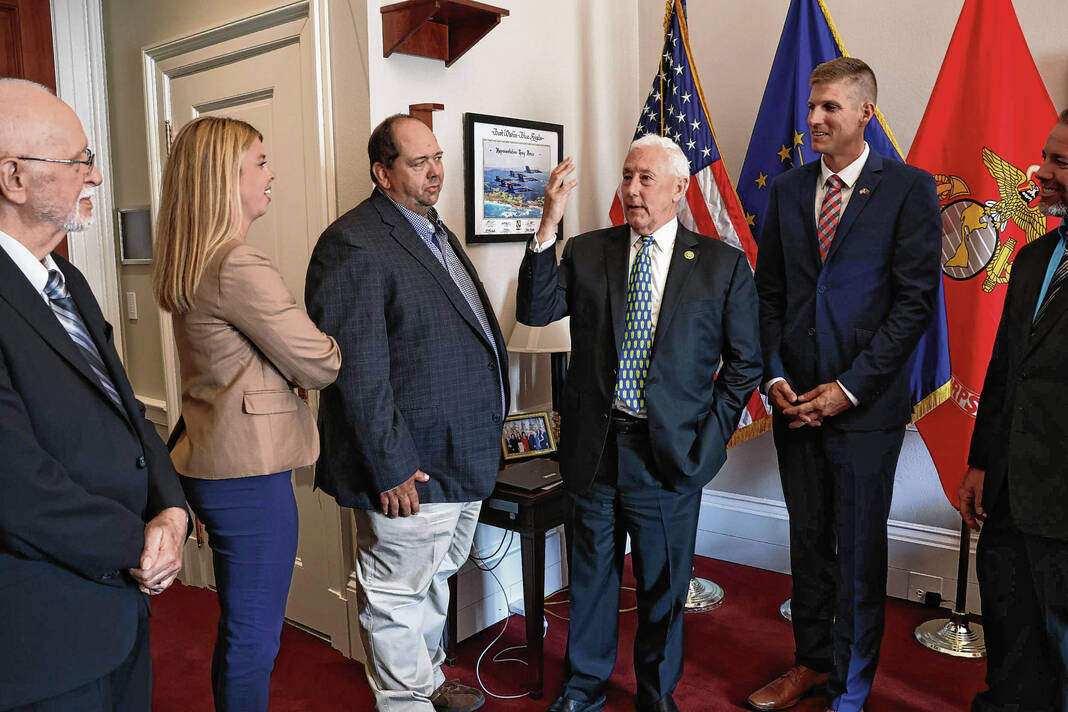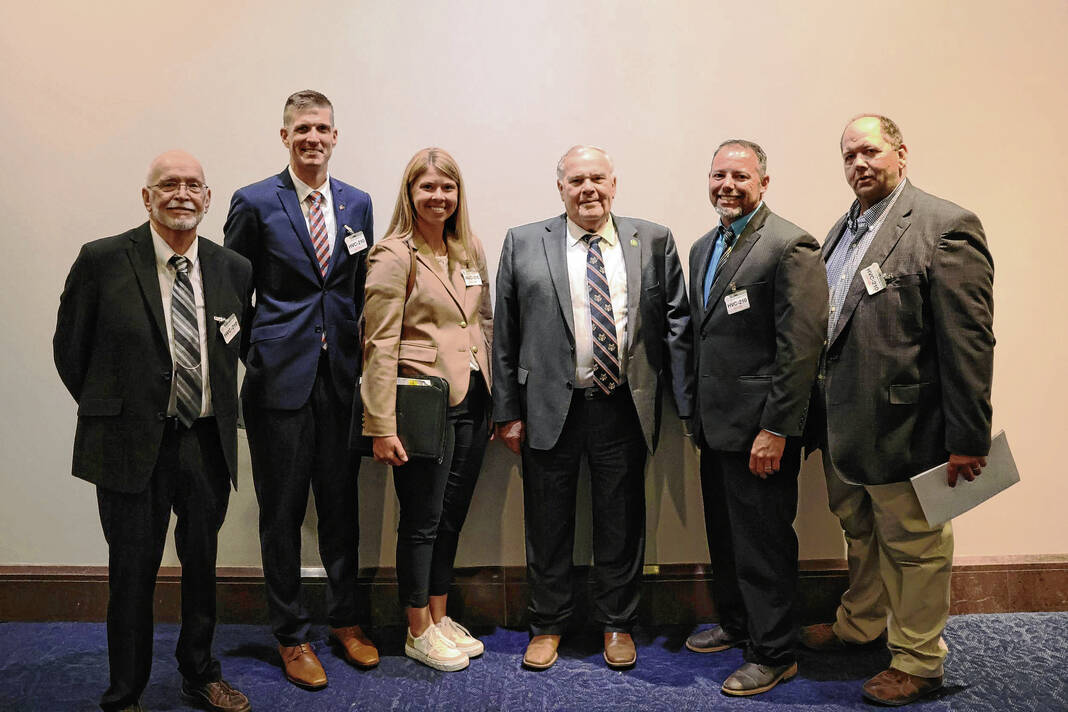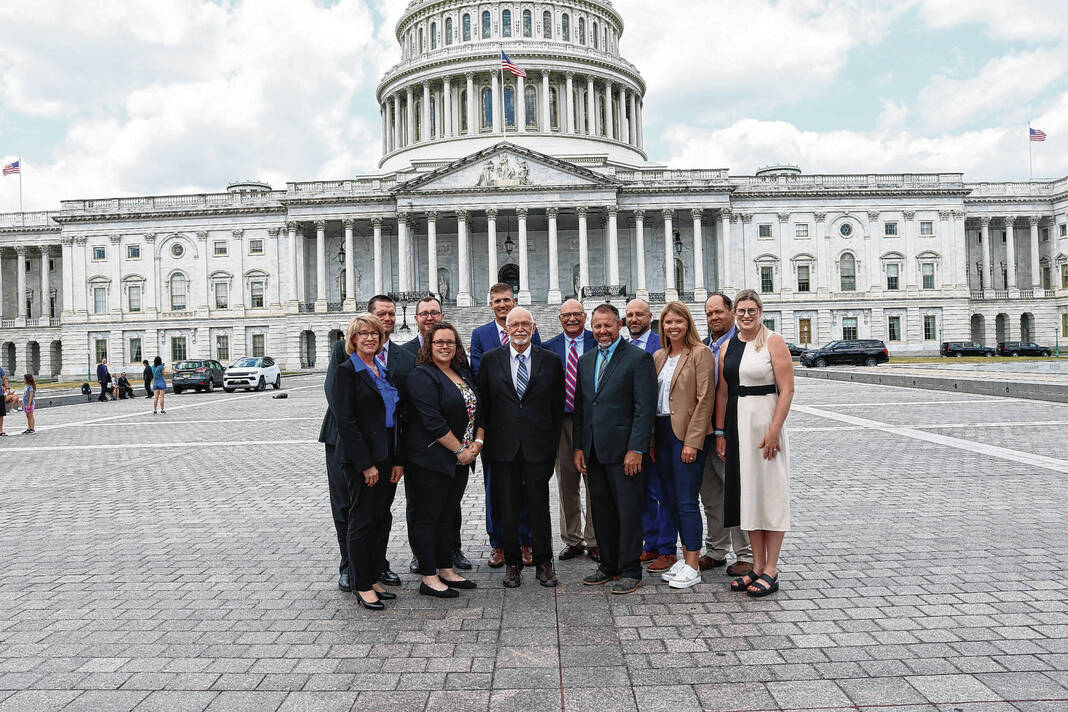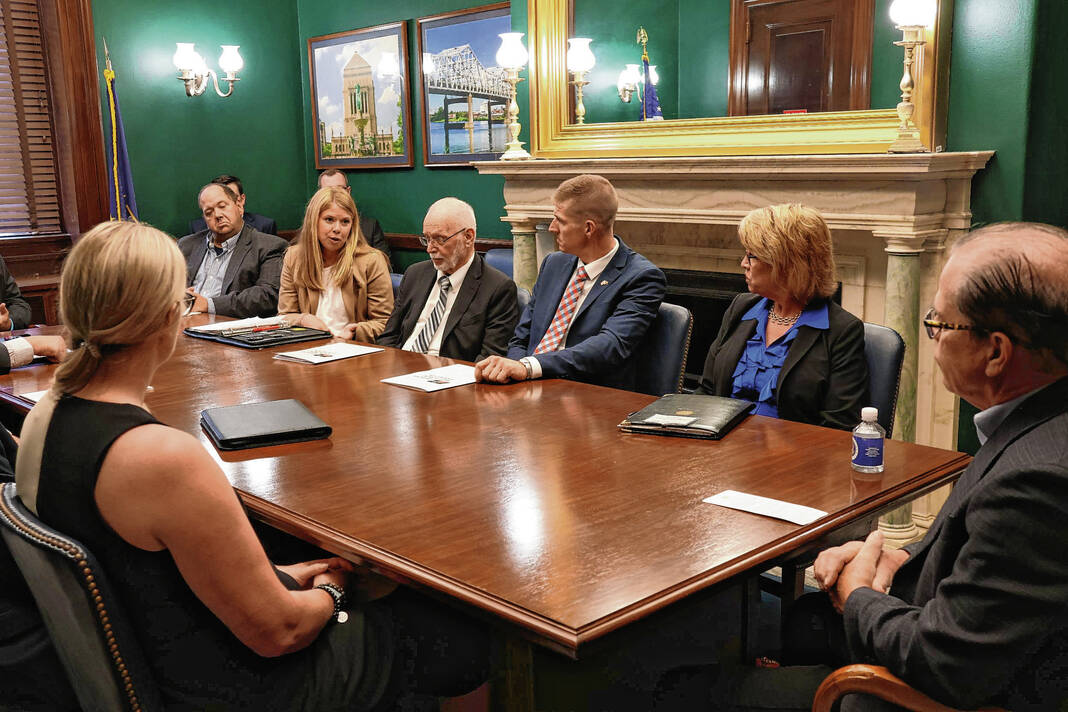Growing up in a family farm operation in Jackson County, Megan VanLiew never thought she would travel to Washington, D.C., to discuss Indiana agriculture with local representatives.
Every five years, Congress passes legislation that sets national agriculture, nutrition, conservation and forestry policy, commonly referred to as the Farm Bill.
VanLiew and others in agriculture had the opportunity in June to talk about what they would like to see in the 2023 Farm Bill right in the nation’s capital.
“This was my first time traveling with (Indiana) Farm Bureau and pitching my idea and thoughts of what we want to see in the Farm Bill, what’s most important and why,” VanLiew said.
The upcoming Farm Bill that will most likely be released this year after Congress returns from its summer recess will include legislation regarding energy, crop insurance, infrastructure, farm policy and much more. This will be the first time for 260 members of Congress to vote on a Farm Bill.
While many factors affect VanLiew’s family operation of selling famous Jackson County watermelons and other produce, she was there to discuss something that is not technically in the Farm Bill but is a huge issue for farmers — agriculture labor.
Hackman Family Farm Market in Vallonia is involved in a visa program called H-2A, where employers are allowed to temporarily hire foreign workers and bring them to the United States legally to perform agricultural labor or services of a temporary or seasonal nature.
VanLiew said these workers come from all over the world, including Mexico, South Africa and Honduras, to name a few.
“They wanted me there to talk about the program and some of the ways it could be improved upon,” she said. “It is getting harder to bring these H-2A workers here.”
VanLiew spent three days in Washington meeting with many local representatives who have a say in legislation involving Indiana.
“They wanted people like me there that actually deal with these problems,” she said. “It was a very eye-opening experience and honestly so awesome.”
VanLiew said the experience of traveling to Washington to talk about something she is passionate about was something she enjoyed.
“These lawmakers were open to listen and seemed engaged about what’s going on in the agriculture industry within Indiana,” she said. “I would say it was well-received, and they looked forward to meeting with us.”
As a spokesperson for the topic of agriculture labor, she said it’s an important and pivotal part of providing food across the country.
“When we started our larger watermelon production, we no longer had enough local people to do what we needed to do, let alone people who were trained, skilled and available,” she said. “So we started using the H-2A program. “
VanLiew said once they come to the United States, these workers will move from Florida all the way up to Indiana or Michigan with a harvest crew. She said they mostly use these workers in the spring for some planting of market crops and the middle of the summer for harvesting watermelons that will be shipped and wholesaled across the country.
“They are pivotal to our business because there is absolutely no one else to do the job here,” she said. “Unfortunately, no one wants to work eight hours a day loading 15- to 20-pound watermelons in 100-degree weather. These guys have been doing it for years, their bodies are built for this kind of work and they enjoy being with people they like and trust.”
VanLiew said by the time they travel to her family farm, they have already been in the United States for four months.
“They are as efficient as it gets when it comes to watermelon harvest. There is not a machine that can do what they do,” she said. “If they decided to not do what they do, the U.S. would live without watermelon.”
Once the harvest crew has finished the harvest season for pumpkins in the fall, they will return to their homeland as part of a requirement of the program.
VanLiew said that is one of many issues with the program that was created in the 1980s.
“When they are required to go home for two months, operations like dairies and orchards that operate year-round struggle because they have to send their guys home,” she said. “It’s constant paperwork and fees to have workers on alternating contracts.”
VanLiew pitched a few ideas to improve the program to make it user-friendly for the worker and the employer.
“One of the ideas I was advocating for was for a process that was digital because currently, it’s all snail mail,” she said. “Currently, there is a 22-day average of contract delay through mailing, and it’s costing the U.S. $320 million in lost revenue.”
VanLiew said while she knows most people who have H-2A employees appreciate them for their work, the cost of being part of the program is astronomical.
As part of the program, employers are required to pay their employees $17.17 an hour plus any contract fees, lodging, transportation through a certified vehicle approved by the government, insurance, inspections and documentation fees.
“Again, I cannot operate without them, so that is a cost I am willing to pay, but it makes it so obvious why people choose not to do it or do it illegally,” she said. “That was one of the things we discussed if there was an easier process for people to do it the right way instead of the wrong way.”
VanLiew said agriculture is one of the biggest industries in the state and important to consumers’ day-to-day life, and without these workers, the country would not be able to run successfully.
VanLiew said not only are these workers important for her business and livelihood, but the workers themselves and their families depend on this program.
“What I am paying these workers provides for their entire extended family back home, which makes a huge difference,” she said. “Their families depend on that money to survive.”
From what VanLiew has been told by some of her workers, there are lists in some of these communities nominating the next person to go to the United States to work.
“It makes you realize just how much they do for you as you do for them,” she said. “We depend on each other.”
During her discussions with lawmakers, VanLiew mentioned a few facts about the program and farm labor to support her thoughts on improving it.
Currently, 50 to 70% of farm labor in the United States is illegal because of how difficult the process can be. Also, the H-2A program alone has between 1.5 to 2 million hired workers, which does not include the number of hired construction workers through a similar program called H-2B.
“Something has got to give,” she said. “They have so much to worry about in D.C. that it makes sense their No. 1 priority isn’t farm workers, but it should be because at the end of the day, it’s the only way they are getting fed.”
By the end of her trip, VanLiew said she left learning more about how the legislation system works, advocating for an important cause and the importance of trust when it comes to issues that can have a major impact.
“I learned how important it is to have somebody you trust talking for you because essentially, the voice these lawmakers carry is the voice of the entire state,” she said.
VanLiew said she was amazed by how quickly messages and changes can be made when there is someone to speak out about it.
“It takes nonstop advocating to get people to understand how important agriculture is to their day-to-day life,” she said. “They liked hearing whatever they accomplished was working for us.”
VanLiew also appreciated the opportunity to network and meet with other farmers with similar backgrounds.
“It was great to meet other people who are just as passionate about agriculture as I am,” she said.
VanLiew said after the lessons she learned from her trip, she will continue to put her ear to the ground on any issues with which she feels Farm Bureau can help lawmakers.
“It’s important to educate others on what the issues are so it doesn’t become their issues in the future because if things don’t improve, it will only get worse for the consumer,” she said. “Either we deal with it now or the consumer will deal with it at the end of the day.”
Since her trip, VanLiew said she already has seen changes being made to not only the Farm Bill but to improve on the issue of agriculture labor.
Two new resolutions have been passed based on agriculture labor reform, S.J.Res.25 and H.J.Res.59, both of which VanLiew said Indiana Republican Sen. Mike Braun was a big advocate.
“It was a nice gesture that he heard what we were talking about in these meetings and then turned around and actually put pen to paper and made changes,” she said.
Overall, VanLiew looks forward to see how her and the others she traveled with made an impact to the upcoming Farm Bill and looks forward to growing more change in the agriculture industry.





